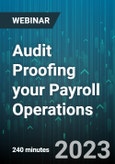Are you publicly traded? If so, the Sarbanes Oxley act demands you have sufficient internal controls over payroll and other systems that materially affect financial statements. Even if you are private, internal audits are essential to ensure long-term compliance and other issues that can affect your company's very existence.
Have you ever been audited by various agencies that require payroll information? Good preparation requires more than just documentation and records. You have to know what to do, and what NOT to do, to ensure a quick audit with positive results.
What are the penalties for non-compliance? Some penalties are increased the longer it takes for you to fix the problem. All penalties can be waived if you know how to address them. Considering most payroll tax audits are three years in length, the more serious non-compliance issues can result in bankruptcy and/or extended legal battles.
Why you should attend
Maybe you've been 'selected' for a payroll tax audit, or maybe you're taking precautions by performing a self-audit.Either way, this 4-hour online training will ensure you don't make mistakes that could land you an audit, you're compliant with current regulations, and your audit-proofing process is flexible enough to adjust to future regulations.
Agenda
What it would mean for you to be audited - and how to safeguard your organization- Evaluate your system for areas at risk, including overtime, independent contractors, fringe benefits, expense reimbursements, executive compensation, minimum wage, multistate employment, and more!
- How to quantify your audit exposure - how much is it going to cost you?
- The most common - and costly - mistakes made in payroll management
- Proof your payroll system with an internal auditor to fix what has happened in your past, adjust your systems for present compliance, and how to sustain a compliant process and system
- Preparing for the payroll tax auditor
- How to negotiate both the time and expense involved in an audit
- How to prepare yourself and employees for interviews (I.e. what you should - and shouldn't - say)
- What records could lead to other audits if you’re not careful - and how to ensure they're accurate and compliant
- The audit's over - but you're not done yet dealing with assessments, penalties, and interest
- When you should ask for a waiver - and when it’s a lost cause
- How to minimize audit penalties
Speaker
Mark Schwartz is an employment tax specialist and has over 15 years of employment tax experience as an independent consultant and as a payroll tax auditor with the State of California. He has managed an audit caseload of 20 ongoing audits, from small home-based businesses to large multi-national corporations. He is expert at defining regulatory and statutory requirements from local, State and Federal government agencies; and helping the average businessperson understand what that means to their business. He has processed weekly and bi-weekly payroll checks plus tax forms for businesses with hourly as well as exempt workers, multistate operations and a wide variety of benefits.
Who Should Attend
- Payroll and HR management and staff
- Audit members of the BODPayroll auditors, HR compliance personnel, and payroll accountants
- CPA, payroll accountants, and independent payroll consultants
- Budget staff
- Internal auditors and regulatory compliance personnel
- Payroll IT developers, programmers, and debuggers








